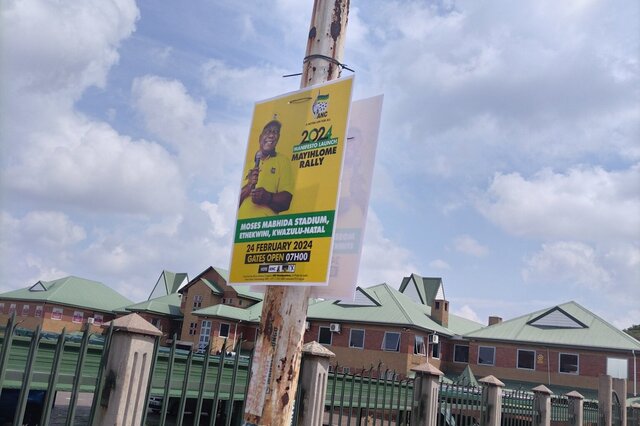Alexandra – Sitting on a low wall in the courtyard of a housing block in Alexandra, Johannesburg’s oldest township, Tumi Phorothwe is hardly buzzing with anticipation ahead of general elections next week.
On May 29, South Africans will vote in what is expected to be the tightest and most consequential poll since the 1994 election that brought Nelson Mandela to power.
But Phorothwe, 30, and many others have since grown disillusioned about the state of the 30-year-old democracy that Mandela fought for so hard.
“Voting nowadays is just another thing, it’s not exciting like back then,” said the supermarket employee, wearing a t-shirt, shorts and flip-flops.
He will exercise his right next week but does not yet know who he will vote for, he added.
“My mom says I should vote for the ANC, she likes the ANC. Other parties are not better,” he said.
In power for three decades, the African National Congress has experienced a sharp decline in support and is expected to lose its outright parliamentary majority for the first time.
President Cyril Ramaphosa’s ANC is credited with winning freedom for all South Africans and lifting millions from abject poverty.
But, beset by graft and mismanagement allegations and a slumbering economy, it has lost appeal, particularly among young people born after the end of apartheid, who lament having dim prospects.
At 45.5 percent, youth unemployment is among the highest in the world.
Their votes could prove decisive. About one in five registered voters is aged between 18 and 29.
But in the last elections in 2019, only 15 percent of all eligible voters aged 18 to 19 and 30 percent of 20 to 29-year-olds cast their vote.
‘Hopeless’
Sporting trendy spectacles and a goatee, Phorothwe said some of his neighbours in the low income block didn’t bother registering.
“They didn’t see a need to. It is hard to convince them,” he said disapprovingly.
The ANC, he said, “brought us democracy, it’s only right to show up and vote”.
“Young people have the right to vote for anybody. Some are voting for the EFF,” he said, referring to the radical leftist Economic Freedom Fighters.
Iphraim, who lives in a studio on the ground floor of the modest brick building, where children chase each other down the stairs, might be among them.
He said he was undecided between the party led by red beret-clad firebrand Julius Malema or the incumbent, as religious music coming from the home of a traditional healer played in the background.
“I look at the history and the ANC is the oldest organisation. They could still do more, a lot of people are hopeless,” he said, preferring not to give his full name.
At 35, he will be voting for the first time.
Elsewhere in the beige building, some mothers hung clothes out to dry on balconies overlooking Sandton, Johannesburg’s affluent business district.
Taking drugs, making babies
A few young people hung about. Many are still sleeping “or smoking”, quipped a teenager. Some drug dealers operate from outside the building.
The ANC is overly maligned, said Khuthadzo, 26, a management consultant dressed in bright colours.
“They haven’t delivered 100 percent but the 20 to 30 percent has made a difference,” she said, while waiting for an Uber.
Yet, she will not be voting next week.
“Unemployment around here is very bad, we need jobs. Everybody is at home all day. If they’re not taking drugs, they’re making babies. We don’t need more babies,” she said. “What if whoever wins becomes worse than the ANC?”
Follow African Insider on Facebook, Twitter and Instagram
Source: AFP
Picture: X/@MaheroSekgala
For more African news, visit Africaninsider.com


